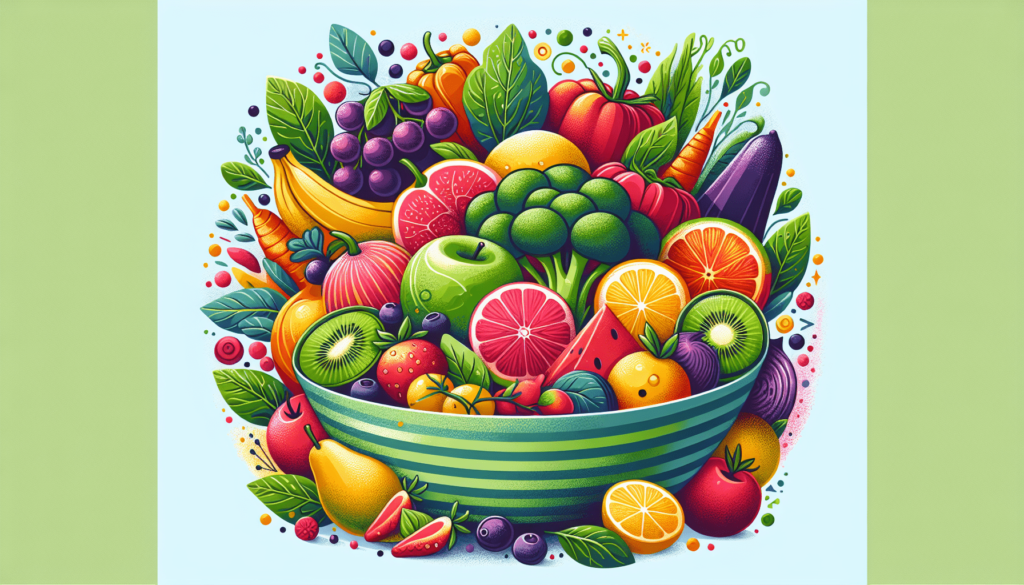Are you looking to enhance your overall well-being and promote a healthier lifestyle? Look no further than the power of plant-based diets. In this article, we explore the incredible benefits and potential impact of integrating plant-based diets into your daily routine. From increased energy levels to improved digestion, discover how embracing a more plant-centric approach to eating can lead to holistic health and happiness.
The Benefits of a Plant-Based Diet
Improved overall health
A plant-based diet can significantly improve your overall health. By focusing on whole, plant-based foods, you are providing your body with essential vitamins, minerals, and antioxidants that are necessary for optimal health. Consuming a variety of fruits, vegetables, whole grains, legumes, nuts, and seeds can help boost your immune system, improve digestion, and promote healthy skin.
Lower risk of chronic diseases
One of the biggest advantages of a plant-based diet is its ability to lower the risk of chronic diseases. Many studies have shown that people who follow a plant-based diet have a reduced risk of heart disease, high blood pressure, type 2 diabetes, and certain types of cancers. This is because plant-based foods are naturally low in saturated fats and cholesterol, and rich in fiber, antioxidants, and phytonutrients that support overall health.
Weight management
Maintaining a healthy weight is essential for overall well-being, and a plant-based diet can help you achieve and sustain that. Plant-based diets are generally lower in calories and higher in fiber, which can help you feel full and satisfied while consuming fewer calories. Additionally, by eliminating or reducing the consumption of processed foods and animal products, you can maintain a healthier body weight and reduce the risk of obesity.
Increased energy levels
If you often find yourself feeling fatigued or lacking energy, a plant-based diet may be just what you need. Plant-based foods are packed with essential nutrients and natural energy sources, such as complex carbohydrates and iron. These nutrients fuel your body and provide sustainable energy throughout the day, helping you feel more alert, focused, and energized.
Understanding the Plant-Based Diet
What is a plant-based diet?
A plant-based diet is centered around consuming primarily fruits, vegetables, whole grains, legumes, nuts, and seeds, while minimizing or eliminating the intake of animal products. The focus is on whole, minimally processed foods that are rich in nutrients and promote optimal health.
Different types of plant-based diets
There are different variations of plant-based diets, each with their own level of restriction. Some common types include vegetarian, vegan, and flexitarian diets. Vegetarian diets eliminate meat but may still include animal products like dairy and eggs. Vegan diets, on the other hand, eliminate all animal products. Flexitarian diets are primarily plant-based but allow for occasional consumption of meat or animal products.
Key principles of a plant-based diet
While there may be variations in plant-based diets, there are some key principles that generally apply to all. These include focusing on whole, unprocessed foods, increasing the consumption of fruits and vegetables, incorporating a variety of grains and legumes, and reducing or eliminating the intake of processed foods, refined sugars, and saturated fats.

How to Start Integrating Plant-Based Diets
Gradual transition
Transitioning to a plant-based diet doesn’t have to be an all-or-nothing approach. It can be helpful to start by making small, incremental changes to your diet. For example, you can begin by having one plant-based meal a day or incorporating plant-based snacks into your routine. This gradual transition allows your taste buds and digestive system to adjust gradually.
Focus on whole foods
When adopting a plant-based diet, it is crucial to prioritize whole, unprocessed foods. This means choosing fresh fruits and vegetables, whole grains, legumes, nuts, and seeds over processed and packaged foods. Whole foods are packed with essential nutrients, fiber, and antioxidants that are beneficial for your overall health.
Experiment with new recipes
Exploring new plant-based recipes can make the transition to a plant-based diet more exciting and enjoyable. There are plenty of resources available, including cookbooks, online recipe databases, and cooking classes that focus on plant-based cooking. Trying new recipes can help you discover new flavors and make your plant-based journey more enjoyable.
Seek support and guidance
Transitioning to a plant-based diet can be easier with the support and guidance of others. Consider joining plant-based communities, online forums, or reaching out to a registered dietitian who specializes in plant-based nutrition. These resources can provide valuable knowledge, advice, and support to help you navigate your plant-based journey successfully.
Meeting Nutritional Needs with a Plant-Based Diet
Protein sources and adequate intake
One common concern for those considering a plant-based diet is acquiring enough protein. However, there are plenty of plant-based protein sources available, such as legumes, tofu, tempeh, seitan, edamame, and quinoa. It is crucial to ensure you are consuming a variety of these protein-rich foods to meet your daily protein needs. The recommended daily intake of protein varies depending on factors such as age, sex, and activity level, so consulting with a healthcare professional or registered dietitian is recommended.
Essential nutrients to be mindful of
While a plant-based diet can provide most of the essential nutrients your body needs, there are a few nutrients that require additional attention. These include vitamin B12, iron, omega-3 fatty acids, calcium, and vitamin D. It is important to be mindful of these nutrients and ensure you are incorporating food sources or supplements to meet your nutritional needs. Consulting with a healthcare professional or registered dietitian can help you create a well-balanced plant-based diet that fulfills your nutrient requirements.
Supplementation if necessary
In some cases, supplementation may be necessary to ensure adequate nutrient intake. It is recommended to consult with a healthcare professional or registered dietitian to determine if supplementation is necessary for you. They can help assess your individual needs and guide you on the appropriate supplements to support your plant-based lifestyle.

Addressing Common Concerns and Misconceptions
Getting enough protein
One of the most common concerns when adopting a plant-based diet is getting enough protein. As mentioned earlier, there are numerous plant-based protein sources available, and with careful meal planning, it is entirely possible to meet your protein needs. By incorporating a variety of legumes, tofu, tempeh, and other plant-based protein sources into your meals, you can ensure adequate protein intake.
Ensuring balanced meals
Balancing meals on a plant-based diet is similar to any other diet. It is important to include a variety of foods from different food groups, such as fruits, vegetables, whole grains, legumes, nuts, and seeds, to ensure a well-rounded and balanced meal. Including a source of protein, healthy fats, and complex carbohydrates in each meal can help meet your nutritional needs and keep you satisfied.
Managing food allergies and intolerances
While adopting a plant-based diet can be a great option for many, it is important to consider any food allergies or intolerances you may have. There are plenty of plant-based alternatives available for common allergens, such as gluten-free grains, dairy-free milk alternatives, and nut-free options. It is essential to read labels carefully and seek out suitable alternatives that meet your dietary restrictions.
Plant-based diets for different life stages
Plant-based diets can be suitable for individuals of all ages, including children, adolescents, and adults. However, it is vital to ensure that all necessary nutrients are being met at each life stage. For example, children and adolescents may require additional sources of calcium and vitamin D for growth and development. Consulting with a healthcare professional or registered dietitian who specializes in plant-based nutrition can provide personalized guidance and ensure that nutrient needs are being met.
Navigating the Grocery Store for Plant-Based Eating
Choosing fresh fruits and vegetables
When navigating the grocery store for plant-based eating, prioritize the fresh produce section. Choose a variety of colorful fruits and vegetables to incorporate into your meals and snacks. Opt for organic options when possible to reduce exposure to pesticides.
Opting for whole grains and legumes
In the grains aisle, look for whole grains like quinoa, brown rice, whole wheat pasta, and whole grain bread. These provide more fiber and nutrients compared to refined grains. Legumes, such as lentils, chickpeas, and black beans, are great plant-based protein sources and can be found in the canned foods aisle.
Identifying plant-based protein sources
Protein is an essential component of a plant-based diet, and it can be found in various plant-based sources. Look for tofu, tempeh, seitan, edamame, and plant-based protein powders in the refrigerated and supplement sections of the store. Nuts, seeds, and nut butter are also excellent sources of protein.
Reading food labels for hidden animal ingredients
When shopping for packaged foods, it is important to read labels carefully to identify any hidden animal ingredients. Some common ingredients to watch out for include milk, eggs, honey, gelatin, and animal-derived additives. By being mindful of these ingredients, you can ensure that the products you purchase align with your plant-based diet.
Creating Balanced and Nutrient-Dense Plant-Based Meals
Building a plate with a variety of colors
Creating a balanced and nutrient-dense plant-based meal starts with building a plate that includes a variety of colors. Aim to fill half of your plate with a variety of vegetables, one-quarter with whole grains or starchy vegetables, and one-quarter with plant-based proteins. This approach ensures that you are getting a good mix of essential nutrients and a visually appealing meal.
Incorporating different cooking methods
To add variety and flavor to your plant-based meals, experiment with different cooking methods. Roasting, sautéing, steaming, and grilling are just a few examples of cooking techniques that can bring out the natural flavors of your plant-based ingredients. Be creative and try new combinations to keep your meals interesting and enjoyable.
Balancing macronutrients and portion sizes
To ensure that your plant-based meals are balanced and provide adequate nutrition, pay attention to your macronutrient distribution. Include a portion of protein, carbohydrates, and healthy fats in every meal. Be mindful of portion sizes to avoid overeating and to maintain a healthy weight.
Meal planning and prepping
Meal planning and prepping can be incredibly helpful when following a plant-based diet. Set aside time each week to plan your meals, make a grocery list, and prepare some components in advance. This can save time during busy weekdays and help you stick to your plant-based eating goals.
The Role of Supplements in a Plant-Based Diet
Determining individual needs
Whether or not you need supplements on a plant-based diet depends on your individual nutrient needs. Factors such as age, sex, activity level, and any pre-existing health conditions can influence the need for supplementation. Consulting with a healthcare professional or registered dietitian can help assess your specific needs and determine if supplementation is necessary.
Common supplements for plant-based diets
There are a few supplements that are commonly recommended for those following a plant-based diet. These include vitamin B12, omega-3 fatty acids (such as algal oil), and vitamin D, especially if sun exposure is limited. Additionally, depending on your diet and lifestyle, supplements like iron, calcium, and vitamin K2 may be necessary. It is crucial to choose high-quality supplements and discuss the appropriate dosages with a healthcare professional.
Ensuring proper absorption and effectiveness
When taking supplements, it is important to ensure proper absorption and effectiveness. Some nutrients, such as iron and calcium, may require specific co-factors for optimal absorption. Consuming vitamin C-rich foods alongside iron-rich foods or taking calcium with vitamin D can enhance absorption. Additionally, taking supplements with meals can help improve absorption and prevent any potential stomach discomfort.
Plant-Based Diet and Digestive Health
Fiber-rich foods for gut health
Plant-based diets are naturally high in fiber, which is essential for maintaining a healthy digestive system. Consuming a variety of fruits, vegetables, whole grains, legumes, and seeds can provide your gut with the fiber it needs to support regular bowel movements, prevent constipation, and promote overall gut health.
Promoting beneficial gut bacteria
A plant-based diet can also promote the growth of beneficial gut bacteria. The fiber found in plant-based foods serves as fuel for the beneficial bacteria in your gut, helping them thrive and support your digestive health. By regularly consuming a wide range of plant-based foods, you can maintain a balanced and diverse gut microbiome.
Addressing digestive issues during transition
Some individuals may experience digestive issues when transitioning to a plant-based diet, such as bloating or gas. This is often temporary and can be attributed to the increased fiber intake. To alleviate these issues, it is important to gradually increase your fiber intake, stay hydrated, and ensure you are properly preparing legumes and grains to improve their digestibility.
Finding balance for sensitive digestion
If you have a sensitive digestion system, it may require some trial and error to find the right balance of plant-based foods for your specific needs. Experiment with cooking methods, portion sizes, and types of foods to identify what works best for you. If needed, consulting with a healthcare professional or registered dietitian can provide personalized guidance to support your digestive health.
Sustainable and Ethical Considerations of Plant-Based Eating
Reducing environmental impact
Adopting a plant-based diet can have a significant positive impact on the environment. Animal agriculture is a major contributor to greenhouse gas emissions, deforestation, and water pollution. By reducing or eliminating the consumption of animal products, you can help reduce your carbon footprint, conserve resources, and contribute to a more sustainable planet.
Supporting humane practices
Another ethical aspect of plant-based eating is supporting humane practices. The conditions in which animals are often raised for food can be inhumane and contribute to animal suffering. By choosing a plant-based diet, you are actively supporting a more compassionate approach to food production and reducing the demand for factory-farmed animal products.
Choosing organic and locally sourced options
When selecting plant-based foods, consider choosing organic and locally sourced options whenever possible. Organic foods are grown without the use of synthetic pesticides and fertilizers, which can be harmful to the environment and human health. Locally sourced foods reduce transportation emissions and support local farmers and businesses.
Exploring plant-based alternatives
As plant-based eating becomes more popular, there is an increasing variety of plant-based alternatives available. From plant-based meats and dairy alternatives to plant-based protein powders and snacks, exploring these alternatives can make the transition to a plant-based diet easier and more enjoyable. Experiment with different options and find the plant-based products that align with your taste preferences and values.
In conclusion, integrating a plant-based diet into your lifestyle offers numerous benefits for your overall health, the environment, and animal welfare. By gradually transitioning to a plant-based diet, focusing on whole foods, and seeking support and guidance, you can successfully embark on a plant-based journey. Remember to prioritize your nutritional needs, address any concerns or misconceptions, and make conscious choices when navigating the grocery store and creating balanced meals. With proper planning and consideration, you can thrive on a plant-based diet and enjoy all the advantages it brings to your holistic well-being.

